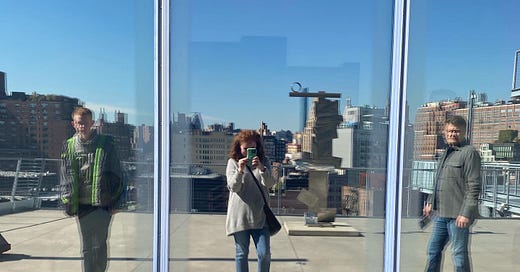We Need More Autistic People In "The Trades"
Career and Technical Education (CTE) Has To Become Neurodiverse
When Steve’s computer wouldn’t turn on last Saturday, he yelled up the stairs for Ian to help out. Ian ran to the garage and got the right screwdrivers. He put that big Dell unit on its side on the floor and opened it up. He removed the innards of the machine, unplugging and plugging in the various components. After three minutes, he looked up and said, “it’s the power supply.”
Ian loaded the unit up into the back of the car — an EMT and his patient — we raced to Best Buy, the big box electronics store, because they have a PC repair service in the store called The Geek Squad. We paid them $200, they opened it up, and they said, “it’s the power supply.”
Afterwards, I asked the pleasant young man behind the counter how he got his job. Did he have a computer science degree? He said that he hadn’t taken any computer college classes, but had picked up information on his own. He explained that the guys in the backroom, who will install the new component and do diagnostics on the machine tonight, took online Geek Squad classes, passed tests, and got certified — also no college education.
The lightbulb went on: Ian could do that.
In 2023, the CDC reported that approximately 1 in 36 children in the U.S. is diagnosed with an autism spectrum disorder (ASD), according to 2020 data. Despite the high prevalence of this disability, 85 percent of adults with autism are unemployed. The neurodiverse population would be better served by a fulfilling job than a government hand-out. We need smart career support for autistic adults, provided by public schools, state labor departments, or non-profit organizations.
Ian’s favorite thing in the world is taking apart computers and putting them back together. With information that he picked up from YouTube videos, Ian upgraded Steve’s PC two or three times using parts from old computers and from Amazon.
Last September, Ian used his birthday gift cards to buy Steve more memory components for his computer. After Steve blew out the candles and opened the gift, Ian marched downstairs to install the parts. Humming to himself as he did the work.
Steve and I have zero involvement in Ian’s self-education about computer technology. Ian knows that we’re ignorant about these matters, so he doesn’t bother sharing what’s he doing with us. Nobody at school taught him any of this either. Ian attended the University of YouTube for his computer science education.
Now, Ian’s amazing computer skills are nothing new. At three, he could set up your VCR and find your passwords on Amazon. His teachers know all about those skills. But until this weekend, I had no idea how Ian, with his quirks and shabby education, could get his dream job. There wasn’t a clear pathway for him to get a job that involved tinkering with the mechanical bits of computers.
Career and Technical Education (CTE) is the hot topic in education circles. Basically, CTE is educational training for hands-on jobs that don’t need a college education — car repair, electrical, plumbing, food preparation, hospitality, and so on. CTE jobs are great, because they will never be taken away by some AI robot. Those who become really good at those jobs have nice salaries and don’t sit on their asses all day in front of a computer.
My contractor, who finished our bathroom projects, has a college degree in economics. He chose to install tile and shore up sagging support beams instead of working on Wall Street, because he likes building stuff. It must be working out for him, because he’s got a second home in Vermont. I wish more young people would consider these jobs.
However, many of these traditional blue collar jobs are not appropriate for autistic people. Because Ian has epilepsy — a common co-morbid disability with autism — he can’t drive. Without a driver’s license, he can’t do most of those jobs.
Also, all those jobs involve working closely with customers. Sometimes customers can be a little crazy. Ian would not know how to handle a customer, who talked too fast or was irrational or didn’t want to pay the bill or a million other random situations that happen every day on a job site.
But Ian could be the guy who works in a backroom at the Apple Store or at the PC repair shop. The clerk at the front desk could handle the crazy people, and Ian could do CPR on broken computers in the backroom in quiet.
For the first time, I see the path for Ian — online computer repair classes and stackable credentials. So, why am I only learning about these options for Ian now? In all the meetings that I’ve had with his schools, nobody told me about these programs and opportunities.
Post-high school transition programs, like anything related to special education, is mediocre at best. On paper, these programs train disabled young people for work; in reality, those programs provide performative education. Aides walk students around the local supermarket or take them to the mall. They have no idea what to do with the 2/3rds of people with autism, who do not have intellectual disabilities.
Outside the special education track, high school guidance counselors are not trained to provide any students with career support. The football player, who can’t pass algebra, isn’t getting a lot of help either. Guidance counselors certainly don’t know what options exist for their neurodiverse students. I learned what Ian needed to do, not from any teacher or school counselors, but from a random conversation at PC tech shop.
We need career professionals who can point parents and young people to the right jobs, help them write resumes, and learn job interviews. They should line up talents and interests with jobs. This help should come from people who understand the physical and social limitations of people on the spectrum. This guidance could happen through public school or with the support of an outside agency.
And then we need more jobs that support autistic’s people limitations. For Ian, he needs jobs with limited customer support and that don’t involve driving or heavy lifting. Other autistic people might need other modifications, like quiet environments or part-time hours.
While some people support a universal basic income to deal with the unemployment problem, employment is better. A job gives a person a purpose in life; a job is a kick in the ass to get out of bed in the morning. I truly believe that everybody can and should contribute to society. We just need to improve those on-ramps to employment.
With this new knowledge about computer repair jobs, Ian has goals. And we have goals to help him reach his goals. Things are coming into focus.
LINKS
Just some links on my main newsletter last week with comments on the blog.

Costs are going up, so colleges are shifting institutional aid to students from wealthier families who can pay at least a part of the tuition, and giving less to poorer students.
Addicted to the Gwyneth Paltrow trial.







Yes, exactly! But I would say, Career and Technical Education Has To Become ....... less fragmented and left to chance altogether. I suppose the current situation is a result of the lack of accreditation and minimal/no tuition, as well as the lack of respect for anything but four year colleges.
But what's the answer? Mostly people just need information. Small offices funded at the county or regional level to gather information and support admissions? I want vocational education to grow - we need it, our kids need it! - without becoming prey for private equity the way early intervention and services for school-aged kids have.
Laura, great post. Thanks!
CTE should be better, indeed. Inadequacies have been documented, but benefits of it have been shown, too (Dougherty et al., 2018, https://journals.sagepub.com/doi/pdf/10.1177/1044207318771673 ).
The post-secondary path should not be limited to higher education. Local education agencies should do a better job of providing career paths (from ambulance dispatcher to zoo caregiver).
To be sure, educators should be enabling students to find and pursue beneficial paths. Let's help kids succeed!